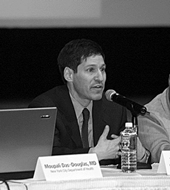Health commissioner aims to streamline testing, strengthen city’s treatment role
The city health department has embarked on a campaign to change the state laws that govern HIV testing and the department’s ability to share medical information about people with AIDS with doctors and other healthcare providers.
The department contacted Gay City News on February 3 offering the interview. Frieden is also talking with mainstream press outlets, legislators, and community groups about his proposals.
One of Frieden’s goals is to eliminate the need for written consent for HIV testing.
“I think outside of the mainstream healthcare system, it’s hard for people to recognize how much of a barrier separate written consent is,” Frieden said during the February 6 interview. “We have separate written consent for things like a lumbar puncture, a surgical procedure… That’s what a separate written consent is used for.”
Frieden would like to see testing done after a simple “yes” from a patient. While he does not maintain that the written consent and counseling requirements extend the time it takes to perform each test—thereby reducing the total number of tests that can be done—he does believe that doctors do less testing because they see the requirements as burdensome.
“They just will not do it,” Frieden said. “It’s not going to happen. We will not be able to routinize and normalize testing while there is separate written consent.”
The state health department issued new regulations on HIV testing last year that reduced the required pre-and post-test counseling and Frieden believes his proposed elimination of the written consent requirement is a step in the same direction.
“That made it possible to do it in a simpler way,” Frieden said. “You can hand out information rather than speak it to somebody, but you still have a lot of mandates that are not necessarily helpful.”
Frieden’s second goal is to allow his department to use data that it already collects to assist in the treatment of people with AIDS.
Currently, doctors are required to report HIV and AIDS diagnoses to the department. Testing labs must report positive HIV tests as well as the results of viral load tests that measure the amount of HIV in a person’s blood, T cell tests that measure the state of a patient’s immune system, and viral nucleotide sequence results that show which anti-HIV drugs, if any, a virus has resistance to.
If that information shows that a patient has an increasing viral load and a falling
T cell count, two indicators of ill health in a person with AIDS, state law bars Frieden’s department from contacting that patient’s doctor. Frieden said that state law also bars his department from directly contacting the patient, though some AIDS advocates question that assertion.
If a doctor has a person with AIDS as a new client, state law prevents Frieden’s department from giving any test results it has to the doctor though the patient could release those results assuming he or she has them. The commissioner said that doctors contacting a new patient’s previous physician for such data often does not yield a timely response.
“People don’t like their information being shared and I understand that fully,” Frieden said. “We already have all the information. We’re just not allowed to use it to help people. That puts me in an unethical situation where I know someone’s going to die and I can’t offer to do something about it.”
Frieden pointed to the ongoing challenges faced by some New Yorkers with AIDS, despite the past decade’s steady advances in treatment, to support his proposals for treatment monitoring and testing.
“If you’re black in New York City you’re three times more likely to have HIV and six times more likely to die from it,” he said. “Not only is there a disparity in infection rates, but among those infected there’s a huge disparity in outcome.”
In 2004, 3,653 city residents were newly diagnosed with HIV, but 1,038 of them received an AIDS diagnosis at roughly the same time. It typically takes eight to ten years to go from being HIV-positive to having AIDS so 1,038 people simultaneously diagnosed with the HIV virus and AIDS were likely infected for years, did not know it, and therefore had received no treatment.
“They had been in and out of hospitals, in and out of all sorts of facilities, and nobody had said, ‘Do you want to get tested?’” Frieden said. “They are much more likely to have infected their partners, their shooting buddies, family, and they are much more likely to die. They’ve got about a 14-fold, 15-fold risk of death in the first year after diagnosis than other people.”
While the problems Frieden has identified are serious, the question is will his proposals address them?
If HIV testing were routine, New York City’s 1,038 late testers might have been offered an HIV test though Frieden conceded he had little data showing these people had not received such an offer.
“We believe so,” he said. “We have some data, but it’s very, very small. What we do know is that they are more likely to be men, they’re more likely to be African-American.”
A number of studies show that the primary reason people avoid testing is that they are afraid they will learn that they are infected. Routine HIV testing may not change that. Frieden disputed the science behind the data on why people don’t get tested.
“I don’t think that’s the main reason people don’t get tested,” he said. “The main reason is usually the doctor didn’t say I should do it.”
Putting aside political and ethical concerns about whether the city should monitor treatment, can it do that job? There are roughly 95,000 people living with HIV in New York City. Some “subset” of that group, “thousands,” Frieden said, would be tracked.
“If we need the resources, we’ll get the resources,” he said. “If I have to take it from other parts of the agency, I’ll take it from other parts of the agency.”
But at what cost?
“I wish I knew, I don’t know,” Frieden said. “Maybe I shouldn’t say that. We don’t know exactly what we’re going to find in terms of the volume of people who need services or the amount of effort it takes up as a department… We can make guesses, but we won’t know until we start doing it.”
Frieden and Mayor Michael R. Bloomberg have set ambitious goals for tackling HIV and believe these proposals will aid in achieving them. In his state of the city address, Bloomberg vowed to cut AIDS death by 40 percent by 2008.
“We won’t be able to do that unless we can improve care for people,” Frieden said, explaining that sharing his department’s medical records will help improve care.
Frieden wants to halve the number of people who get who do not learn of their HIV diagnosis until that have already advanced to AIDS.
“We think if we do a better job of both normalizing testing, breaking down the barriers, as well as some other specific targeted testing efforts… We think we should be able to cut that number in half,” he said.
By when?
“However long it takes to get it done,” Frieden said.
gaycitynews.com


































